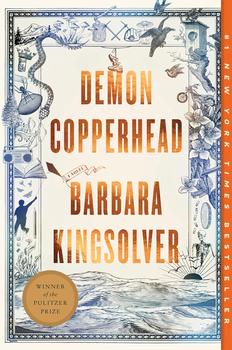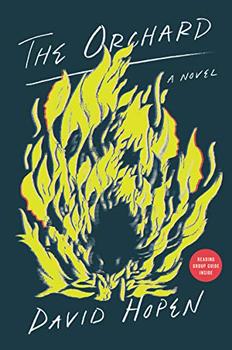Summary | Excerpt | Reviews | Beyond the book | Read-Alikes | Genres & Themes | Author Bio

A Novel
by Alan HollinghurstAlan Hollinghurst's novel Our Evenings is the fictional autobiography of Dave Win, a British actor who's in his early 70s as the novel opens. He's just learned about the death of Mark Hadlow, who was a father-figure to him, and Dave's grief prompts him to revisit his own life. Dave proceeds to narrate his experiences, from their first meeting in the 1960s, when he was just thirteen, to Brexit and the early days of the COVID-19 pandemic.
The first half of the book is Dave's recollections of his time at a boy's boarding school. Hadlow and his wife Cara have provided him with a scholarship and taken the boy under their wing, treating him almost like a son. Their actual child, Giles, is a bully who torments Dave (we learn in the prologue that as an adult Giles has become a far right-wing politician, estranged from his parents). As a half-Burmese child, Dave is subjected to constant harassment from his classmates, enduring their racism to deflect what he perceives would earn him more persecution: the fact that he's gay. Although Dave is a brilliant student, he discovers that his true love is acting, and Part 1 closes with him abandoning his studies in favor of the stage.
In the novel's second half, Dave recalls times in his life that were especially meaningful to him. These chapters read more like connected short stories, the incidents they relate separated by years (sometimes decades). Most of Dave's memories circle around specific relationships; one section, for example, concentrates on his relationship with Chris, his first real love. The opening of the next chapter makes it clear that Dave and Chris are no longer together and that Dave is now involved with another actor. Since at first we have no idea how much time has passed, this transition is initially a bit disorienting, but over the course of the narrative one gets a rough idea of the timeframe and what's happened in the interim.
Dave's life is simultaneously remarkable and ordinary, in the same way most people's lives are. Hollinghurst's brilliance is in compelling his readers to become completely invested in this character, to love him and rejoice with him and grieve with him. Dave becomes real to us, and utterly unforgettable.
Interestingly, although this is a story of lifelong growth, there's a lot the author chooses to omit about Dave's life. Dave acknowledges his sexuality right from the novel's introduction of him at age thirteen, so readers don't witness his struggles with his identity, or even know if he experienced any. We learn about his first crush—a professor with whom he bonded over Leoš Janáček's piano work, On an Overgrown Path (see Beyond the Book)—but not his first physical encounter. We know he experiences racism and homophobia, but he talks about these experiences matter-of-factly, without anger. The remarkable thing about this technique is that it actually makes Dave feel more authentic. One gets the sense that as he narrates his story, he's not so much keeping his audience at arm's length as repressing unpleasant memories, choosing instead to focus on the people he's loved.
And then, of course, there's Hollinghurst's magnificent writing:
"I didn't think much about Mum's evenings, the hundreds of suppers that by now she had sat down to eat alone … [M]ainly I see her by the fire, head tilted over her work under the bright lamp, and now and then catching my eye when she tied off a thread or looked round for her needle-case of scissors. I see her dark hair and high forehead but still not really her face, more familiar to me than anyone's; and I see her hands, as familiar, too, in their way, strong, broad-knuckled and nervously revealing. See them, and feel, even now, how warm they were."
Although lyrical writing can sometimes slow a book's pace, Hollinghurst's prose is so captivating that it renders the book utterly engrossing. Not only is the author's attention to detail exquisite, but often his observations hit home ("In your fifties and sixties your father-figures drop away—the ones who had licensed, enabled and witnessed your life—and no one can replace them").
The character of Giles is one of the book's only weaknesses. Dave crosses paths with him throughout the narrative, and each time Giles is the same: a caricature of the schoolyard bully. The character falls flat, and because the rest of the novel is so masterful this imperfection becomes all the more evident.
Our Evenings is the first novel I've read by Hollinghurst, but it certainly won't be the last. I found it exceptionally moving, beautifully written, and likely indelible for years to come. It compares well to coming-of-age classics such as James Joyce's A Portrait of the Artist as a Young Man and Nicholas Nickleby by Charles Dickens, as well as more recent novels like Barbara Kingsolver's Demon Copperhead. Readers who've enjoyed those books will very likely find much to love about Our Evenings.
![]() This review
first ran in the November 20, 2024
issue of BookBrowse Recommends.
This review
first ran in the November 20, 2024
issue of BookBrowse Recommends.

If you liked Our Evenings, try these:

by Barbara Kingsolver
Published 2024
From the New York Times bestselling author of Unsheltered and Flight Behavior, a brilliant novel which enthralls, compels, and captures the heart as it evokes a young hero's unforgettable journey to maturity.

by David Hopen
Published 2021
A commanding debut and a poignant coming-of-age story about a devout Jewish high school student whose plunge into the secularized world threatens everything he knows of himself.
I have lost all sense of home, having moved about so much. It means to me now only that place where the books are ...
Click Here to find out who said this, as well as discovering other famous literary quotes!
Your guide toexceptional books
BookBrowse seeks out and recommends the best in contemporary fiction and nonfiction—books that not only engage and entertain but also deepen our understanding of ourselves and the world around us.